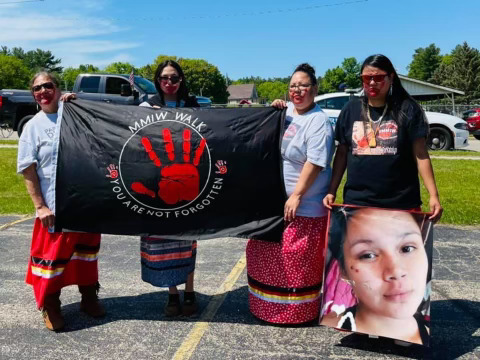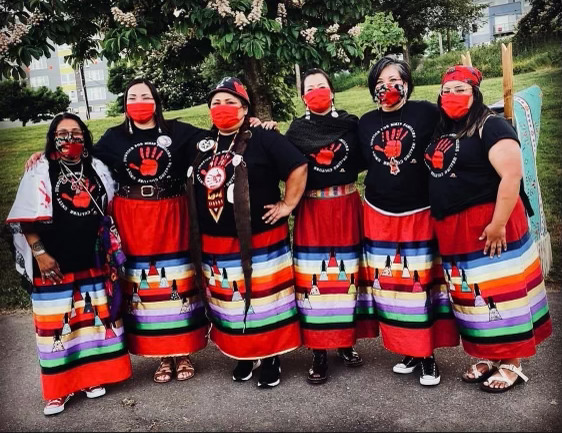According to the National Crime Information Center, there were 5,712 reports of missing Indigenous women and girls in 2016. Of those reports, only 116 cases were logged in the US Department of Justice’s federal missing person database. Indigenous women, girls, and two-spirit people are murdered at rates ten times higher than all other ethnicities, with murder being the third leading cause of death for this population.
Despite the prevalence of this violence, the issue has remained at the margins of mainstream media coverage and national conversation.
To combat this systematic silencing around murdered and missing Indigenous women and people (MMIWP), grassroots organization Maeqtekuahkihkiw Metaemohsak Inc. (Woodland Women) and local Indigenous art collective giige will host a candlelight vigil at the Capitol this evening in honor of National MMIWP Awareness Day.
The first portion of the day-long event will begin at noon, where attendees will be tasked with wrapping red clothing around the Capitol in support of survivors and their families. One of the event’s organizers, Rachel Fernandez, came up with the idea after attending many sexual assault vigils in which denim garments were similarly displayed in public spaces. Fernandez is a Menominee tribal legislator and has been a life-long advocate for issues relating to gender based violence, working in both the Menominee reservation’s domestic violence shelter and the crime victims program.
Fernandez’s work has opened up the space for her to speak with many community members and their experiences with a wide range of injustices.
“We just started around my kitchen table beading and through that, we were able to have these conversations on everything, all [of the] issues that were affecting us, which is gender based violence, addiction, recovery, [and] homelessness,” Fernandez said. “And we found that connecting to our teachings and cultural ways, our lifeways, was a good way to heal.”
The annual day of remembrance is an effort to turn this healing outward, providing families of those missing and murdered with the opportunity to share their stories with their community members as well as non-Indigenous allies. “It’s really important that we amplify, we uplift, we empower these families, our relatives, to speak at our State Capitol, because we want those leaders there, we want them to hear the stories, we want to hear those names,” Fernandez shared.
Hosting the vigil at the Capitol is a strategic move, one that Fernandez hopes will create a sense of accountability for Wisconsin lawmakers.
“We want them to know that we are going to keep going, we are going to keep trudging along, we’re going to keep fighting, we’re going to keep demanding justice for our relatives, and they need to step up,” she said.
While the disappearances and deaths of Indigenous community members have been a prevalent issue for centuries across continental North America, a lack of mainstream media coverage has allowed it to carry on as a silent epidemic.
“When we go missing, we don’t get the alert. We don’t get the report on the evening news or anything,” Fernandez said. “It really hits to my core. […] We don’t even get a response or are acknowledged. We’re the ones that are doing the work. We’re out there [doing] grassroots.”
The second half of the day, which will start at 6 p.m., will feature red dress dances, a community round dance, and the candlelight vigil itself. In planning this event, Fernandez emphasized the importance of making space for joy amid grief.
“When we talk about traumatic things, I like to put in the balance so that the opposite to that is healing and resilience and love. And that’s what we want to encourage for our families and our survivors,” she said. “There’s that intergenerational trauma, that historical trauma, [but] we can actually create our intergenerational healing and our intergenerational acceptance, that forgiveness, that love and that relation that we have to one another. And we can create that space for ourselves and for our relatives that are hurting and show them that [even] in tragedy and despair and hurt, in heartbreak, we have healing.”
The color red will play a significant part in the day of awareness, a color that is sacred to Indigenous culture. In addition to being the only color that spirits can see, red also speaks to being one with the earth.
“One of my elders told me that red is part of the earth. Red is part of our mother. And so our first mother, our first Mother Earth, she’s the one that grows us,” Fernandez said. “She’s the one that has the water element to her. So with our women, we have that water element too, we have that when we grow our lives inside of us.”
Fernandez and the other organizers hope that this year’s day of awareness will be the first step in healing for those affected by this longstanding, painful legacy of colonization.
“That healing begins within yourself. […] When you look inward, and you start to connect to who you are, and you start remembering, your spirit remembers who you are, and that’s when that healing starts and you start to open up and things are happening in a good way,” she said. “We have our law enforcement, we have our judicial system. We have the systems that are in place that are supposed to be helping us [but at] times they’re harming us.”
While non-Inidgenous allies are encouraged to come and show their support, Fernandez urges everyone to be mindful of how they show up in the space.
“I really would like to see allies stand with us [and] not stand in front of us. Uplift, share the stories or the posts or whatever. [But] don’t take the space. Remember that it’s our story,” Fernandez cautioned.
To further support the year-round work that Woodland Women and giige do in relation to MMIWP, red clothing with artwork designed by giige collective member nipinet landsem will be available for purchase on the collective’s Bonfire shop until the day of the event.



































